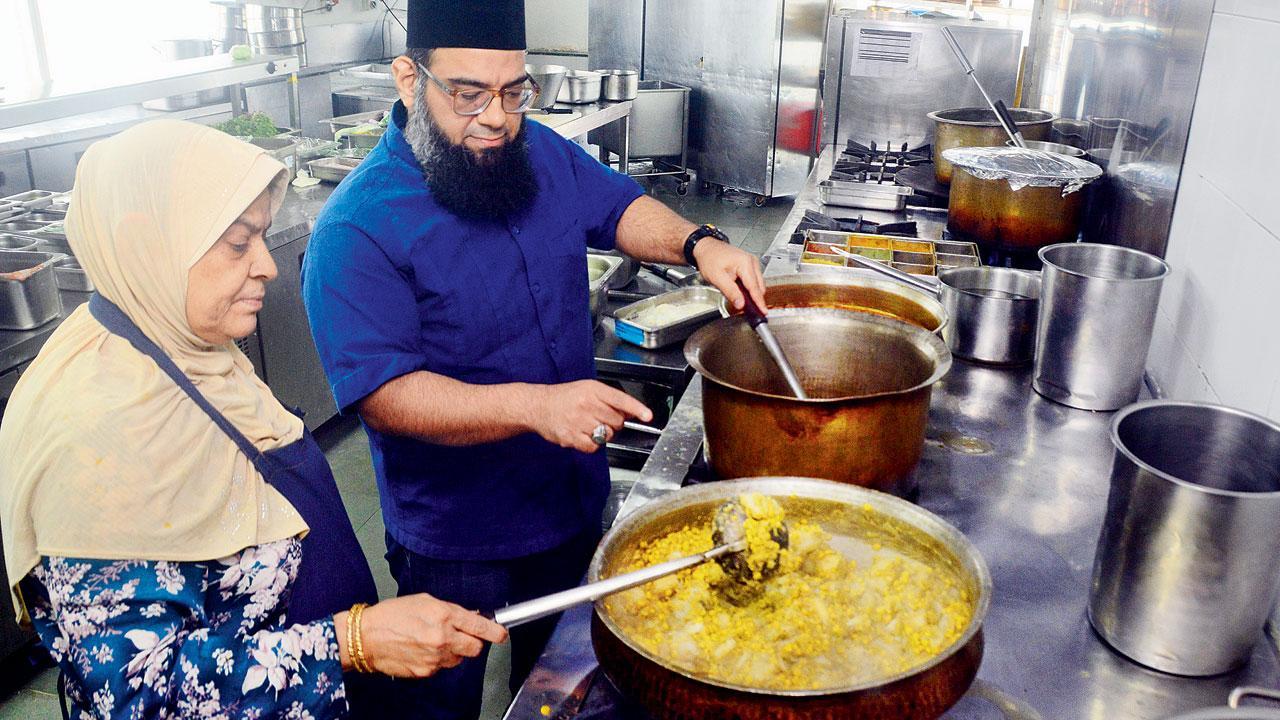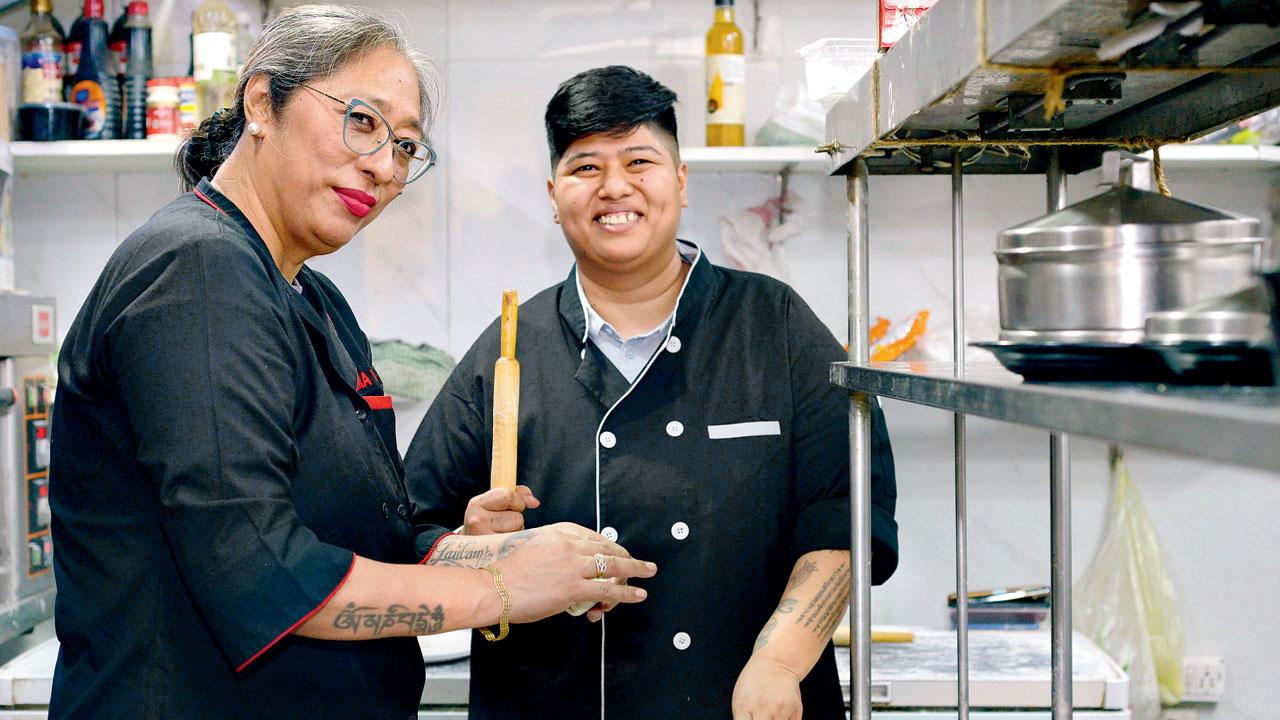Even with a new guard vibe, these mother-and-son culinary teams prove that mum is still the boss in the kitchen

Nazish and Osama Jalali are a strong team in the kitchen. Pic/Satej Shinde
She hated it when her son entered the kitchen. In Nazish Jalali’s home, a man doesn’t enter the kitchen. “But I couldn’t resist his passion,” she says of her son, writer-turned-chef Osama Jalali, best known for his work on the cuisine of Rampur, the princely estate in Uttar Pradesh and his research on dying regional cuisines. The trio—Nazish, Osama and his wife Nazia—travel as a family to curate regional food festivals around the world. Last week, they were at The Westin Garden City curating Rivayaat-e-Rampur festival when we spoke to them.
ADVERTISEMENT
Osama’s fascination for food stemmed from watching his mother cook meals in huge deghs for feasts at their home. “He would stop crying only if I made him sit on the kitchen counter while I made rotis,” says Nazish. He started his career by writing about food and reviewing restaurants and moved to the other side in 2012. “It was a natural progression. If it wasn’t for this, I’d have been a full-time sportsperson. Even now, I compete professionally at the state powerlifting championships,” he adds.
A taskmaster in the kitchen, Nazish demands everything to be in its place and is a stickler for quality ingredients, meat cuts and prefers using traditional techniques and vessels. “Whatever I know about perfection is from her. Cooking is an art, not a job. She taught me to never cook in a hurry. A good meal requires patience and it must be made with love and an intention to feed someone from the heart,” says Osama.

Doma Wang is old school in her approach and took time to offer son Sachiko space and agency to experiment with contemporary ideas
Nazish is pleased that her son taught her to be proud of regional, ghar ka khana. She adds, “As a son, Osama is caring, loving and too lazy to do anything. As a chef he is helpful and very disciplined. I love his time management skills and how he thinks out of the box.”
The duo does face creative differences. “Ammi never likes to change or tweak things and follows a recipe like it has been written, for ages. But over time, I have tried to convince her that occasionally, we should make the dish as per the customer’s requirement as well. Cooking at food festivals has taught us how to adapt to different palates. However at home, no changes are entertained,” he laughs. “He convinces me to mellow down and has made me more open-minded when it comes to cooking for others,” says Nazish, who graciously extended an invitation to us to come over to their home for aloo katliyan, dahi phulki and mooli ki bhaji.
She’s a people person and he’s happy behind the curtains and the two make a fantastic team. If it wasn’t for his interest in cooking and food, Sachiko Seth, son of Doma Wang, the momo queen of Kolkata, would have been a tattoo artist. But given that he was born in a home brimming with good cooks and foodies, and spent his childhood watching his mother cook for a living, he was drawn to joining her professionally. Doma secretly wished that he’d become a chef and continue her work. “When he was 13, he’d come back to Kolkata from boarding school, go straight to the restaurant, keep his bag at the counter and enter the kitchen. It made me happy. Sachiko was keen to learn and had a passion for cooking. He never enjoyed the privilege of being my child and had to start with washing the dishes like all my other staff.”
Sachiko’s first memory in his mother’s kitchen is of, “my ‘bananas in pyjamas’ sectioned melamine plate filled with four chicken fried momos, two fried manchurian balls and a dollop of ketchup. It is still my comfort food. I did not always want to be a chef; the transition was natural. It started with the quest for pocket money and the interest grew as I climbed the kitchen ladder. She is a thorough taskmaster. When I worked under her, there were no offs and the salary was minimal. But because she put in as much work as us, we couldn’t complain.”
Previously, the two wouldn’t spend too much time together in the kitchen as they’d land up having arguments. “We do have a lot of creative differences as I am old school and he thinks we can have a modern approach to our food. It was difficult for me to accept it but now I believe that ‘The old order changeth, yielding place to the new’. Sachiko’s creations like the chilly butter wings and his twist on his grandfather’s recipes have become bestsellers in our restaurants,” says Doma.
Sachiko remembers having arguments and banging the door behind him. “Things changed once she decided to give me space. It’s a shift and I think both of us are getting used to it. From her, I learnt how to not compromise on the food you serve. And to do menial jobs too. She learnt that from her father.” The duo say they have ‘grown up’ and realise that working together, sharing ideas and cooking up a storm, can be delightful.
Sachiko has taught Doma to be a little flexible while cooking. “He also taught me how to delegate; I don’t have to kill myself over every single task. His strength in the kitchen is his confidence and calmness. If he likes something he has eaten, he works on recreating it. That’s his forte. His chilli butter wings, Hainanese chicken rice and selrotis are to die for,” she adds.
Sometimes they cook dinner together—Doma makes glass noodles with beef and potatoes while Sachiko makes ting mo (steamed buns) to go with it. “We have our individual style of cooking, and with time, we have learnt to respect this. I feel blessed to have him to carry on the legacy and add value and new flavours to the business,” she adds.
 Subscribe today by clicking the link and stay updated with the latest news!" Click here!
Subscribe today by clicking the link and stay updated with the latest news!" Click here!







